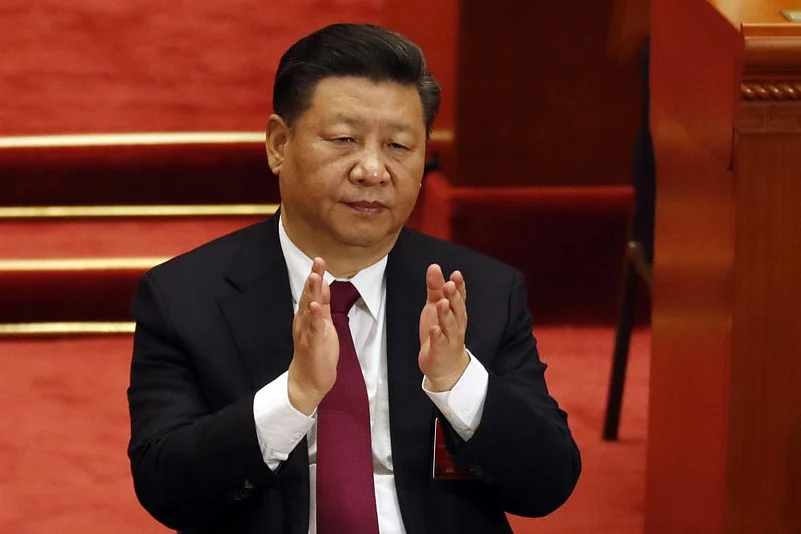Chinese President Xi Jinping has praised the Communist Party of China 's(CPC) one-party system saying that multi-party democracy promotes "nasty competition".
His statement has come even as Jinping is all set to solidify his rule with an unlimited tenure.
He was all praise for the one-party system furthered by the ruling Communist Party saying that it prevented rotation of power and "nasty competition" among political parties in a multi-party democracy.
The system of multi-party cooperation and political consultation led by the Communist Party of China (CPC) is "a great contribution to political civilisation of humanity," Xi told delegates from some of the small political parties which functioned in low key manner under the shadows of the CPC.
The Chinese system is new, Xi said, because it unites all political parties and people without party affiliation toward a common goal, effectively preventing the flaws of the absence of oversight in one-party rule, or "power rotation and nasty competition among multiple political parties," state-run Xinhua news agency reported today.
It steers away from another weakness of the old-fashioned party system, in which decision making and governance, confined by interests of different political parties, classes, regions and groups, tears the society apart, he said.
Chinese leaders in the past have vowed not to ape the western political systems.
Xi was speaking at a joint panel discussion yesterday with "political advisors" from the China Democratic League and the China Zhi Gong Party, those without party affiliation and those from the sector of returned overseas Chinese, at the first session of the advisory body the Chinese People's Political Consultative Conference (CPPCC), the Xinhua report said.
His comments came as the Chinese Parliament, the National People’s Congress (NPC), began its two week long annual session today with a legislative agenda which included ratifying a constitutional amendment removing the two-term rule for the President and Vice President.
The rule followed by the CPC for over two decades to prevent dictatorial ruler emerging from the ranks as well as to promote collective leadership effectively removes the last hurdle for 64-year-old Xi to continue beyond the end of his second term in 2023 and possibly for life.
Xi is already regarded as the most powerful leader of China after Chairman Mao Zedong as he held the posts of head of the CPC, the military and the Presidency.
The NPC was also expected to endorse another draft constitutional amendment to enshrine Xi Jinping Thought on Socialism with Chinese Characteristics for a New Era in the fundamental law.
This would ensure that Xi's name is written into the Constitution making him on par with Mao.
The draft suggests Xi Jinping thought be juxtaposed with Marxism-Leninism, Mao Zedong Thought, Deng Xiaoping Theory, and the Theory of Three Represents as a new guiding theory in the preamble of the Constitution, Xinhua said.
The name of Xi and his thought figured numerous times in the annual work report read out Premier Li Keqiang today at the opening session of the NPC, which observers said conferred to Xi the status and authority which was enjoyed by Mao during the heydays of China’s revolution which brought CPC to power in 1949.
Since then CPC remained the only ruling party. In the subsequent years, it permitted eight non-Communist parties which functioned under the shadows and authority of CPC.
Xi said the Chinese system is new because it combines Marxist political party theories with China's reality, and truly, extensively and in the long term represents fundamental interests of all people and all ethnic groups and fulfills their aspiration, avoiding the defects of the old-fashioned party system which represents only a selective few or the vested interest.
The system also pools ideas and suggestions through institutional, procedural and develops a scientific and democratic decision making mechanism, he said.
Fitting China's reality and fine traditional culture, it is "a great contribution to political civilisation of humanity," he said.
Xi said upholding the CPC leadership was not meant to do away with democracy. Instead, it aims to create a form of democracy that is broader and more effective, he said.
The CPC-led system of multiparty cooperation and political consultation stresses both the CPC leadership and socialist democracy which features political consultation, participation in the deliberation of state affairs, and democratic supervision, he said.
Acknowledging their contribution to achievements made in the past five years, Xi called on non-communist parties and people without party affiliation to enhance confidence in the path, theory, system, and culture of socialism with Chinese characteristics, consolidate political orientation and actively offer their suggestions.
Non-communist parties and people without party affiliation should act as good consultants, aides, and co-workers of the CPC while improving their capability of consultation, he said.
He urged intellectuals to set the example of upholding socialist core values and organisations of returned overseas Chinese to unite and mobilise overseas Chinese.
Nearly 3,000 legislators from around the country will attend the two-week gathering of NPC in Beijing.





















